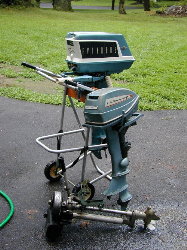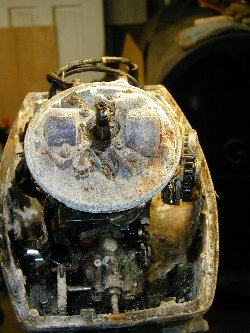
|
Tech
Tip #2 - So You Have An Old Outboard Motor…..
Since launching this site I get a lot of emails from people looking for information on their old outboard. Many of the same questions are asked over and over, this page is an attempt to give general answers to the top 5 most common FAQ's that come up. What is my old outboard worth? This is the most common question that I hear and the toughest to answer, especially sight unseen. Unlike old cars, toys and even comic books, old outboards are simply not that valuable. This is because there are literally millions of them around. Why….
Okay, lets sum it up: a large supply, small demand, not really a necessity, get the picture? About the best tool out there to give some idea of value is Peter Hunn’s OLD OUTBOARD BOOK. You could also try keeping an eye on e-bay auctions of similar motors but I have found this to be extremely unreliable since the prices fluctuate widely day to day and week to week. Of course any valuation would depend on condition; what one person considers a real beauty may be junque to another. All too often a motor that looks nice on the outside can have major issues on the inside. Many times it can take a trained professional to assess the condition and repairs needed to put an old outboard right - often the cost to do this can be far in excess of what it is worth. And just because a motor has been stashed in a bedroom closet for 40 years doesn't mean that things haven't gone awry - coils, impellers & fuel system parts will deteriorate regardless of where the motor is stored.
True, there are some very old motors and some very rare motors that are worth a lot relative to the average Elgin, Scott Atwater or Johnson TN-26. To put it in perspective, even a Clarke Troller twin or 1912 Evinrude is typically selling for less than a set of nice clean bumpers for a ’57 Chevy Bel Air! Where do I get parts for my old outboard? Try the links section or Webvertize ad at the AOMCI web site, even better is to join the AOMCI and place an ad in the club newsletter. Believe it or not, many Evinrude/Johnson (OMC) parts are still available from your local Bombardier dealer! Unfortunately, I have found that most Mercury dealers think a motor from 1990 is too old to get parts for…. I recommend OldMercs.com if you need parts for an old Merc, the information on their website is an excellent tool. There are a few people who have small businesses specializing in particular makes of old outboards; Martin, Scott-Atwater and Chris-Craft are just a few. They can be found in the links section of the AOMCI web site. Lastly, a good NAPA or other auto parts store should have access to the Sierra Marine catalog listing thousands of common consumable outboard parts like coils, carb kits, gaskets, etc… While I prefer original equipment (o.e.) parts, many of these aftermarket parts are pretty good. One word of caution; don’t automatically assume that the aftermarket parts will be less expensive than the same o.e. part. I have run into several cases where the original part was SIGNIFICANTLY LESS EXPENSIVE than the aftermarket! What type of oil/gas should I use in my old outboard? (Please read, this is important!) 2-Stroke Oil: Need more of an explanation, see this link; 2-Cycle Oil & You! IMPORTANT: Never use modern oil intended for a 4-stroke car in 2-stroke equipment – it will destroy it. Years ago, before detergents were in 4-cycle oil and before good 2-stroke oils were developed, this may have been okay - today it is unacceptable. I have seen many, many, old motors ruined from the use of cheap, inappropriate or simply not enough oil. While name-brand oils do cost more, any good mechanic will confirm that a quality oil not only reduced friction but also; burns cleanly and leaves no ash/coke in the combustion chamber or in the exhaust. The few dollars more for a good oil is a small price to pay to prevent major mechanical issues. Remember: more oil does no harm but too little can be devastating. Whenever one is in doubt about what the ratio should be for a particular motor, posting the question on the AOMCI Ask A Member board will often yield an answer. Gasoline: A major issue for the old outboard is the use of ethanol as an additive in modern fuels. Essentially alcohol, these additives are really trouble for the rubber parts in the fuel system. If you have any fuel system parts made of black neoprene rubber, (fuel line, carburetor float bowl gasket, needle tip, fuel valve packing, etc..), the alcohol will dissolve them. Problems from a plugged fuel line to fuel dripping everywhere are the result. (I have a friend who lost a beautiful 1959 Chevy Impala when the fuel line failed due to ethanol and leaking gasoline started a fire - fortunately nobody was hurt or killed.) About the only option to remedy the problem of these reformulated fuels is to replace all the rubber components with ones that are able to cope with the new fuels. If you are interested in knowing more about the % of alcohol of your fuel, I recommend the Briggs & Stratton alcohol test kit p/n 100023, about $5 at your local B&S dealer. When I tested our local Mobil station I found they had 18% ethanol (it is supposed to be no higher than 10%), a lethal brew to my old equipment. Since then I have been forced to upgrade all my rubber components or import my fuel from nearby states that do not have additives. Where can I find more information
on my old outboard? |

